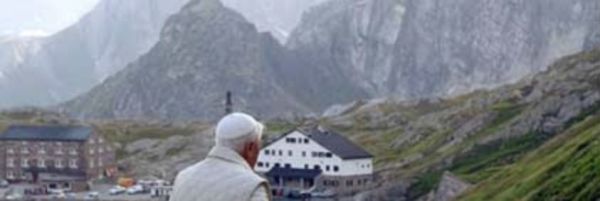The words spoken by Jesus after his invocation, “Father”, borrow a sentence from Psalm 31[30]: “into your hand I commit my spirit” (Ps 31[30]:6). Yet these words are not a mere citation but rather express a firm decision: Jesus “delivers” himself to the Father in an act of total abandonment. These words are a prayer of “entrustment” total trust in God’s love. Jesus’ prayer as he faces death is dramatic as it is for every human being but, at the same time, it is imbued with that deep calmness that is born from trust in the Father and from the desire to commend oneself totally to him.
In Gethsemane, when he had begun his final struggle and his most intense prayer and was about to be “delivered into the hands of men” (Lk 9:44), his sweat had become “like great drops of blood falling down upon the ground” (Lk 22:44). Nevertheless his heart was fully obedient to the Father’s will, and because of this “an angel from heaven” came to strengthen him (cf. Lk 22:42-43). Now, in his last moments, Jesus turns to the Father, telling him into whose hands he really commits his whole life.
Before starting out on his journey towards Jerusalem, Jesus had insisted to his disciples: “Let these words sink into your ears; for the Son of man is to be delivered into the hands of men” (Lk 9:44).
Now that life is about to depart from him, he seals his last decision in prayer: Jesus let himself be delivered “into the hands of men”, but it is into the hands of the Father that he places his spirit; thus — as the Evangelist John affirms — all was finished, the supreme act of love was carried to the end, to the limit and beyond the limit.
Dear brothers and sisters, the words of Jesus on the Cross at the last moments of his earthly life offer us demanding instructions for our prayers, but they also open us to serene trust and firm hope. Jesus, who asks the Father to forgive those who are crucifying him, invites us to take the difficult step of also praying for those who wrong us, who have injured us, ever able to forgive, so that God’s light may illuminate their hearts; and he invites us to live in our prayers the same attitude of mercy and love with which God treats us; “forgive us our trespasses and forgive those who trespass against us”, we say every day in the Lord’s prayer.
At the same time, Jesus, who at the supreme moment of death entrusts himself totally to the hands of God the Father, communicates to us the certainty that, however harsh the trial, however difficult the problems, however acute the suffering may be, we shall never fall from God’s hands, those hands that created us, that sustain us and that accompany us on our way through life, because they are guided by an infinite and faithful love. Many thanks.
[Pope Benedict, General Audience, 15 February 2012]












